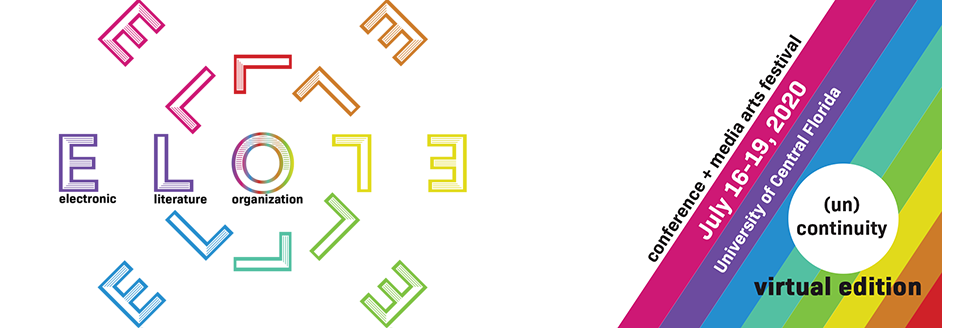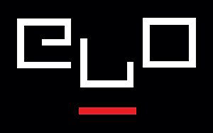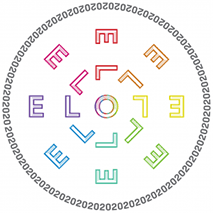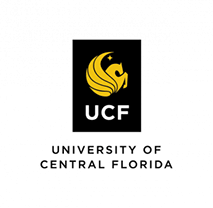Loading...
Submission Type
Virtual Engagement Session
Start Date
17-7-2020 1:00 PM
End Date
17-7-2020 2:00 PM
Abstract
What does it meant to be together apart? How can we create and share ideas from an (un)distance? Please join us in this experimental panel in a talk show format.
- The panel will be moderated in channels: A zoom moderator (Anna Nacher and Annie Abrahams), a framapad moderator (Deena Larsen),a twitter moderator (Johannah Rodgers) and panel participants: Eugenio Tisselli, Kirill Azernyy, Renee Carmichael, and Roderick Coover will weave their experiences and works into a panoply of insights into what it means to practice undistancing, or b(e/r)ing us together to share ideas, potential collaborations, and partnerships over various (di)stances and (di)scourse:
- Eugenio--(un)distance to the material sources of electronic technologies
- Renee--(un)distancing between the function and the feeling
- Kyrill--(un)distance to artifacts
- Anna - inhabiting various degrees of (un)distancing
- Deena-(un)distance to collaborate with those who can not be present physically (disability, travel, funding)
- Annie-(un)distance as a life-long practice
This panel was originally envisioned as an experiment to provide a talk show format discussion between online participants and in person participants in Orlando. As the ELO conference moves online, this Undistance panel will experiment with the potential for completely online networking and exchanging ideas at this and future ELO conferences. As this discussion will center around long-distance writing practices, and will self-reflexively discuss how effective on-line community discussion works, this experimental venue will demonstrate that more in-depth online exchanges are possible. ELO members will engage online in an exchange about their practice, weaving in an array of video extracts and demos together in a real-time e-lit fabric that also includes unexpected interruptions, time lapses, and glitches as part of the expected process. The online audience will participate via videoconferencing (Zoom or conference online venue), hashtag discussion via live tweeting (#ELO#UnDistance), and collaborative annotating via Framapad, thus usingopen access communication tools and incorporating as many live online channels as possible. Panelists will employ short provocations to the other panelists (ranging from scholarly observations to theoretical manifestos to pointed questions to silence) in an interrupt/collaborate collage of ideas. The final 15 minutes of the panel will be transferred to an open Framapad where panelists and audience will continue the discussion. Before: The Framapad will be open before the panel with a series of questions on distance collaborations--please add your insights. During The panel will be moderated during the videoconferencing portion of the panel in channels (Zoom, Twitter, YouTube, and Framapad) concentrating on audience questions during the last portion of the panel. After We will transcribe and record the Zoom and leave the Framapad open for afterthoughts and further discussion for a week at the end of the conference. The Framapad will then be archived at that point as a seed crystal for articles, scholarly observations, and historic record of thoughts on distance collaboration.
Archives of the framapad are available here:
https://annuel2.framapad.org/p/(un)distance/timeslider https://annuel2.framapad.org/p/(un)distanceBIS/timeslider And the PDFs can be downloaded below.
un(distance)
What does it meant to be together apart? How can we create and share ideas from an (un)distance? Please join us in this experimental panel in a talk show format.
- The panel will be moderated in channels: A zoom moderator (Anna Nacher and Annie Abrahams), a framapad moderator (Deena Larsen),a twitter moderator (Johannah Rodgers) and panel participants: Eugenio Tisselli, Kirill Azernyy, Renee Carmichael, and Roderick Coover will weave their experiences and works into a panoply of insights into what it means to practice undistancing, or b(e/r)ing us together to share ideas, potential collaborations, and partnerships over various (di)stances and (di)scourse:
- Eugenio--(un)distance to the material sources of electronic technologies
- Renee--(un)distancing between the function and the feeling
- Kyrill--(un)distance to artifacts
- Anna - inhabiting various degrees of (un)distancing
- Deena-(un)distance to collaborate with those who can not be present physically (disability, travel, funding)
- Annie-(un)distance as a life-long practice
This panel was originally envisioned as an experiment to provide a talk show format discussion between online participants and in person participants in Orlando. As the ELO conference moves online, this Undistance panel will experiment with the potential for completely online networking and exchanging ideas at this and future ELO conferences. As this discussion will center around long-distance writing practices, and will self-reflexively discuss how effective on-line community discussion works, this experimental venue will demonstrate that more in-depth online exchanges are possible. ELO members will engage online in an exchange about their practice, weaving in an array of video extracts and demos together in a real-time e-lit fabric that also includes unexpected interruptions, time lapses, and glitches as part of the expected process. The online audience will participate via videoconferencing (Zoom or conference online venue), hashtag discussion via live tweeting (#ELO#UnDistance), and collaborative annotating via Framapad, thus usingopen access communication tools and incorporating as many live online channels as possible. Panelists will employ short provocations to the other panelists (ranging from scholarly observations to theoretical manifestos to pointed questions to silence) in an interrupt/collaborate collage of ideas. The final 15 minutes of the panel will be transferred to an open Framapad where panelists and audience will continue the discussion. Before: The Framapad will be open before the panel with a series of questions on distance collaborations--please add your insights. During The panel will be moderated during the videoconferencing portion of the panel in channels (Zoom, Twitter, YouTube, and Framapad) concentrating on audience questions during the last portion of the panel. After We will transcribe and record the Zoom and leave the Framapad open for afterthoughts and further discussion for a week at the end of the conference. The Framapad will then be archived at that point as a seed crystal for articles, scholarly observations, and historic record of thoughts on distance collaboration.
Archives of the framapad are available here:
https://annuel2.framapad.org/p/(un)distance/timeslider https://annuel2.framapad.org/p/(un)distanceBIS/timeslider And the PDFs can be downloaded below.




Bio
Annie Abrahams is known for her netart (Being Human – online low tech mood mutators / not immersive.1996 - 2007) and collective writing experiments. She is an internationally regarded pioneer of networked performance art. Abrahams has performed and shown work extensively in France, including at the Centre Pompidou and the Jeu de Paume, Paris, and in many international galleries as the Museum of Contemporary Art in Zagreb; the Stadtgalerie Mannheim, Germany; the Black Mountain College Museum + Arts Center in Asheville, USA; the New Museum, New York; Furtherfield Gallery, London; NIMk, Amsterdam and Aksioma in Ljubljana. She was lead-performer in ELO2017 Porto. https://bram.org
Eugenio Tisselli is a programmer, writer and researcher. As a programmer-writer, he has explored the different ways in which code influences our understanding of the world, and has attempted to write against meaning by focusing on the materiality of language. As a programmer-researcher, he has become engaged with social and environmental issues which have led him to develop platforms for the collaborative creation of community memories. He is a computer scientist, holds a master's degree in digital arts, and has received a PhD from the University of Plymouth. He has presented his work in multiple conferences, festivals and exhibitions. His writing-related work can be read at http://motorhueso.net, and his platform-based research may be accessed at http://ojovoz.net.
Deena Larsen Deena Larsen has been playing with these concepts of melding art and text, programming and tech, for decades. She has presented her work in many conferences and exhibits. She ran CyberMountain way back when, which was one of the first to introduce a distanced keynote speaker, Stuart Moulthrop. She has collaborated in person and long distance on many projects, including Cold Calling with Jon Saklofsky, Ouroboros and Jabberwocky with Stuart Moulthrop, and Eliza and Andromeda with Anastasia Salter.
Anna Nacher – an associate professor at the Institute of Audiovisual Arts, Jagiellonian University, Kraków, Poland. 2019 Fulbright Scholar-in-Residence at Creative Digital Media program of Winona State University. Her research interests include media art, electronic literature, media theory, and environmentalism. The author of three books in Polish, the newest one published in 2016 focuses on locative media imagery. A reworked version of one chapter has been published as "Internet of things and automation of imaging: beyond representationalism" in "communication+1", vol. 5 (2016). Published numerous articles in journals and chapters in edited volumes including Hyperrhiz, Electronic Book Review, Communications+1. Most recently published VR - the culture of (non)participation? Reframing the participative edge of virtual reality in Eriksson B., Stage C., Valtysson B. (eds.) Cultures of participation. Arts, Digital Media and Cultural Institutions, Routledge, New York and London. She is also a part-time musician and a passionate gardener in a tiny permaculture farm located in Slovakian Carpathians. Full information: http://nytuan.wordpress.com
Roderick Coover's latest book is The Digital Imaginary: Literature and Cinema of the Database (2019 Bloomsbury Press https://www.bloomsbury.com/us/the-digital-imaginary-9781501347580/) and his latest media arts works include the virtual reality (VR) narrative The Key To Time, made with composer Krzysztof Wolek, and the locative and performance-based VR work Altering Shores, made with composer Adam Vidiksis and computational poet Nick Montfort. Both works are designed for 360 cinema, domes and VR viewing (https://unknownterritories.org).
Azernyi Kirill - fiction writer and poet, translator and amateur game designer. Writes and publishes works in Russian and in English. Has two books of prose (2015 and 2018), participated in International Writing Program of the University of Iowa (2015). Now has a site and a FB group devoted to digital art and electronic literature. Participated in 2020 Critical Code Studies Working Group. A PowerPoint-based novel for formatting was published in March 2020 - the work is devoted to exploring "materiality" of a digital object that might be able to obtain properties close to a physical one (rigidity and plasticity) when it comes to interacting with it.
Renee Carmichael is a researcher, writer and artist. She is a doctoral candidate in Comparative Art Theory at the Universidad Nacional de Tres de Febrero, Argentina. Her research focuses on the aesthetics of contemporary dance and code, exploring a relationship between the formal and the feeling. She has a master’s degree in Interactive Media: Critical Theory and Practice from Goldsmiths College, London, has worked as a researcher in the HybridPublishing Lab at Leuphana University, Germany and is founder of the experimental publishing project Flee Immediately!. Her texts have been published internationally in both academic and artistic platforms. Her research and artworks often bring together poetic ideas that explore the boundaries between theory and practice. http://renee-carmichael.com/